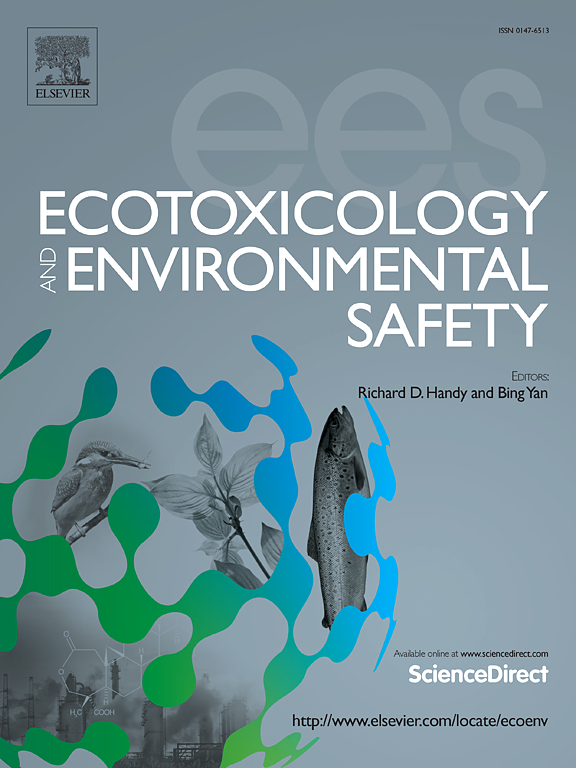Heavy metal content in perch and rudd tissues and associated health risk assessment
IF 6.2
2区 环境科学与生态学
Q1 ENVIRONMENTAL SCIENCES
引用次数: 0
Abstract
Fish meat is recommended for consumption as a source of protein, essential unsaturated fatty acids, and fat-soluble vitamins, unfortunately it can also be a source of dangerous contaminants. The aim of the study was to assessment the level of Zn, Cu and Pb in water and bottom sediments collected in summer and autumn from the Koronowo Reservoir and the Wierzchucińskie Duże Lake and in the tissues of perch (Perca fluviatilis L.) and rudd (Scardinius erythrophtalmus L.) for health risk assessment of potential consumers. Metals accumulated in the tissues in the following order: meat, liver and gills: Zn > Cu > Pb. Of the four factors taken into account, such as: type of tissue, fish species, catching season and place of catching, the first one determined the degree of metal accumulation to the greatest extent. The high level of Pb in muscle tissue was determined by the content of this metal in tissue collected from rudd from Wierzchucińskie Duże Lake in the summer (0.383 mg kg−1 ww). The bioconcentration factor (BCF) of Pb, Zn and Cu in all tissues of analysed fish was much higher from water than from sediments. The highest value of metal pollution index (MPI) in the meat (1.42), liver (12.97), and gills (8.49) was calculated for summer-caught fish. The research indicated that consumption of 100 g of fish meat could meet daily requirement for Zn up to 26.3 % and for Cu in 16.4 %. The potential risk of Pb consumption according to RDA is as much as 2.4 %.
鲈鱼和赤鲈组织中的重金属含量及相关健康风险评估。
鱼肉作为蛋白质、必需的不饱和脂肪酸和脂溶性维生素的来源被推荐食用,但不幸的是,它也可能是危险污染物的来源。这项研究的目的是评估夏季和秋季从科罗诺沃水库(Koronowo Reservoir)和杜泽湖(Wierzchucińskie Duże Lake)采集的水和底层沉积物中以及鲈鱼(Perca fluviatilis L.)和赤鳕(Scardinius erythrophtalmus L.)组织中的锌、铜和铅含量,以便对潜在消费者进行健康风险评估。金属在组织中的累积顺序如下:肉、肝和鳃:锌 > 铜 > 铅。在考虑的四个因素(如组织类型、鱼的种类、捕捞季节和捕捞地点)中,第一个因素在最大程度上决定了金属的积累程度。夏季从杜泽湖(Wierzchucińskie Duże Lake)采集的大鳞鳊鱼组织中的铅含量(0.383 mg kg-1 ww)确定了肌肉组织中的高铅含量。被分析鱼类所有组织中铅、锌和铜的生物富集系数 (BCF) 在水中都比在沉积物中高得多。夏季捕捞的鱼肉(1.42)、鱼肝(12.97)和鱼鳃(8.49)中的金属污染指数(MPI)值最高。研究表明,食用 100 克鱼肉可满足 26.3% 的锌和 16.4% 的铜的日常需求。根据 RDA,食用铅的潜在风险高达 2.4%。
本文章由计算机程序翻译,如有差异,请以英文原文为准。
求助全文
约1分钟内获得全文
求助全文
来源期刊
CiteScore
12.10
自引率
5.90%
发文量
1234
审稿时长
88 days
期刊介绍:
Ecotoxicology and Environmental Safety is a multi-disciplinary journal that focuses on understanding the exposure and effects of environmental contamination on organisms including human health. The scope of the journal covers three main themes. The topics within these themes, indicated below, include (but are not limited to) the following: Ecotoxicology、Environmental Chemistry、Environmental Safety etc.

 求助内容:
求助内容: 应助结果提醒方式:
应助结果提醒方式:


